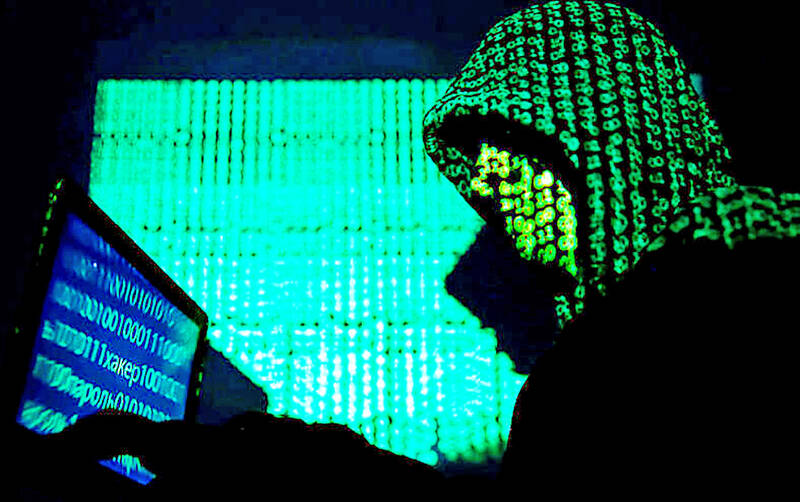The Ministry of National Defense’s (MND) Information, Communications and Electronic Force Command (ICEFCOM) yesterday denied accusations by China that it had undermined regional security by carrying out cyberattacks against targets in China, adding instead that Beijing was responsible for raising tensions and undermining regional peace.
The Chinese Ministry of State Security on WeChat accused a hacker group called “Anonymous 64” of targeting China, Hong Kong and Macau starting earlier this year through frequent cyberattacks.
The group carried out cyberattacks to seize control of Web sites, outdoor electronic billboards and video-on-demand platforms in China, Hong Kong and Macau, it said, adding the hackers’ activities include spreading false information, creating rifts in the public and weakening the governance of the Chinese Communist Party.

Photo: Reuters
It claimed that “Anonymous 64” is actually a front for ICEFCOM’s Cyber Warfare Unit, and identified three individuals it said are members of the Taiwanese military being investigated for being involved in the alleged cyberattacks
ICEFCOM, established in July 2017, is a relatively new, but important unit responsible for managing military communications, network security and information warfare. It has about 6,000 personnel.
ICEFCOM yesterday denied the allegations, and instead called out China’s use of “gray zone” tactics as raising regional tensions.

Photo: screen grab from China Central Television
“The current enemy situation and cyberthreats are severe,” it said in a statement. “The Chinese communist military and forces that coordinate with it continue to use aircraft, ships and cyberattacks to harass Taiwan and are ... undermining regional peace.”
The geopolitical threats Taiwan faces are severe, including disruptions by aircraft, naval vessels, cyberattacks, misinformation and other means, ICEFCOM said, adding that it would continue to strengthen its defenses to maintain national security.
The ministry said that “Anonymous” is a well-known hacker collective that frequently targets undemocratic regimes, and China has added the No. 64 to the name to make it seem as though it is the sole target.
It is an attempt by China to gloss over recent accusations from the international community regarding its cyberwarfare tactics, as well as a way of undermining international support for Taiwan, it added.
A national security official speaking on condition of anonymity yesterday said that it is an attempt by China to increase domestic anti-Taiwanese sentiment and inflame tensions across the Taiwan Strait.
Institute for National Defense and Security Research deputy CEO Shen Ming-shih (沈明室) said that China publishing the names and photographs of the accused is an attempt to create a chilling effect within Taiwan’s armed forces and deter personnel from being loyal to the government.
The invisible nature of cyberwarfare means that ICEFCOM and its cyberunit often engage in highly sensitive and covert operations.
ICEFCOM played a major role in the 2022 Han Kuang 38 live-fire joint military exercise, where it simulated key military command centers under attack transferring to backup command centers, sources said. It also played a key role in defending Taiwan’s digital infrastructure in August of that year when then-US House of Representatives speaker Nancy Pelosi visited Taiwan, leading to Chinese cyberattacks on Web sites, digital billboards and other infrastructure, they said..
Additional reporting by Aaron Tu, Chen Yu-fu and Reuters

CHAOS: Iranians took to the streets playing celebratory music after reports of Khamenei’s death on Saturday, while mourners also gathered in Tehran yesterday Iranian Supreme Leader Ayatollah Ali Khamenei was killed in a major attack on Iran launched by Israel and the US, throwing the future of the Islamic republic into doubt and raising the risk of regional instability. Iranian state television and the state-run IRNA news agency announced the 86-year-old’s death early yesterday. US President Donald Trump said it gave Iranians their “greatest chance” to “take back” their country. The announcements came after a joint US and Israeli aerial bombardment that targeted Iranian military and governmental sites. Trump said the “heavy and pinpoint bombing” would continue through the week or as long

TRUST: The KMT said it respected the US’ timing and considerations, and hoped it would continue to honor its commitments to helping Taiwan bolster its defenses and deterrence US President Donald Trump is delaying a multibillion-dollar arms sale to Taiwan to ensure his visit to Beijing is successful, a New York Times report said. The weapons sales package has stalled in the US Department of State, the report said, citing US officials it did not identify. The White House has told agencies not to push forward ahead of Trump’s meeting with Chinese President Xi Jinping (習近平), it said. The two last month held a phone call to discuss trade and geopolitical flashpoints ahead of the summit. Xi raised the Taiwan issue and urged the US to handle arms sales to

BIG SPENDERS: Foreign investors bought the most Taiwan equities since 2005, signaling confidence that an AI boom would continue to benefit chipmakers Taiwan Semiconductor Manufacturing Co’s (TSMC, 台積電) market capitalization swelled to US$2 trillion for the first time following a 4.25 percent rally in its American depositary receipts (ADR) overnight, putting the world’s biggest contract chipmaker sixth on the list of the world’s biggest companies by market capitalization, just behind Amazon.com Inc. The site CompaniesMarketcap.com ranked TSMC ahead of Saudi Aramco and Meta Platforms Inc. The Taiwanese company’s ADRs on Tuesday surged to US$385.75 on the New York Stock Exchange, as strong demand for artificial intelligence (AI) applications led to chip supply constraints and boost revenue growth to record-breaking levels. Each TSMC ADR represents

Pro-democracy media tycoon Jimmy Lai’s (黎智英) fraud conviction and prison sentence were yesterday overturned by a Hong Kong court, in a surprise legal decision that comes soon after Lai was jailed for 20 years on a separate national security charge. Judges Jeremy Poon (潘兆初), Anthea Pang (彭寶琴) and Derek Pang (彭偉昌) said in the judgement that they allowed the appeal from Lai, and another defendant in the case, to proceed, as a lower court judge had “erred.” “The Court of Appeal gave them leave to appeal against their conviction, allowed their appeals, quashed the convictions and set aside the sentences,” the judges